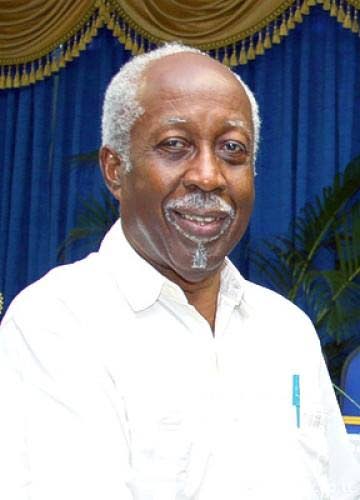(Trinidad Express) Former head of the public service Reginald Dumas has called for any Government efforts towards constitutional reform to be all-inclusive, including that national consultations “reach every community”.
Dumas also said constitutional reform was “much needed”, but expressed doubt as to whether an advisory board announced last week by Prime Minister Dr Keith Rowley could finish the task in the three months given.
In a telephone interview with the Express last weekend, the former diplomat said Trinidad and Tobago was critically in need of constitutional reform. He welcomed the announcement last Thursday by Rowley that the Cabinet had appointed a seven-member advisory board on the issue, to be chaired by former House speaker, attorney Barendra Sinanan.
Other members as stated by the PM are former Tobago House of Assembly (THA) chief administrator Ray Sandy; retired clerk of the Parliament Jacqui Sampson-Miguel; retired permanent secretary Winston Rudder; attorney and former House speaker Nizam Mohammed; and Hema Narinesingh, accountant at Ernst and Young.
However, Dumas described the matter of reform as “complex” and said the Constitution was behind every aspect of the country’s activities and services, including the education system.
The Prime Minister stated at Thursday’s post-Cabinet briefing that the advisory board was appointed to formulate the terms of reference and collect views from the public on constitutional reform, with an aim to provide the Government with recommendations for a national consultation.
Rowley said the “national advisory committee shall consider and make recommendations to the Cabinet within three months of its appointment for the promotion and convening of a National Constitutional Conference and Consultation in June 2024”.
Dumas said the issue should be tackled with a view to consultations being as widespread as possible and inclusive, with input from communities across the country through public fora.
But some sectors that were in need of urgent addressing may need more time, such as education, he said, linking some aspects of the current system to increasing dropout rates and crime.
Deeper level
Dumas said the Constitution as it impacts public service, including State agencies, had to be considered at a deeper level.
Tobago-based Dumas recalled several discussions on constitutional reform with late former prime minister Basdeo Panday, who believed that any such action must involve the citizens as much as possible.
Among the changes were that the people should be able to vote for an executive president, Dumas said.
“Rather than now, where we have a situation where the president is, in essence, selected by the government as they have the majority in the electoral college,” he said. “Panday felt that that should not be the case.”
Dumas added that on the matter of the population’s involvement in reform, “how we go about doing it, without splitting the country further, is something we will have to look at very, very carefully”.
He said one aspect of reform should look at the “right of recall”, where an elected official including an MP ”could be recalled by the electorate for non-performance”.
Dumas said he assumed the appointed committee would be “meeting with all the people”, adding that he believed the population would be interested and would attend public consultations. “In that case, I think that the three-month period given may be too short,” he said.
Dumas said such bodies have to be outfitted with resources, including administrative support and space to do its work, which would sometimes take months.
He said public consultations, for instance, should be plentiful and reach rural communities, without being confined to a handful of events in main town areas. And the planning of an exercise, of the scope required to meaningfully address T&T’s constitutional reform, would be no simple matter.

